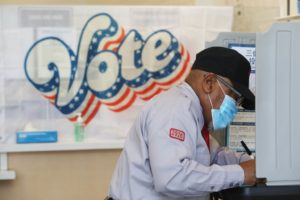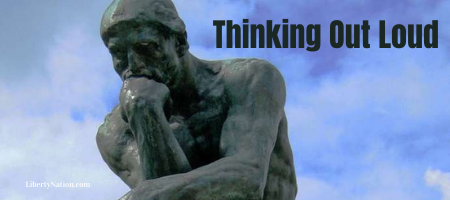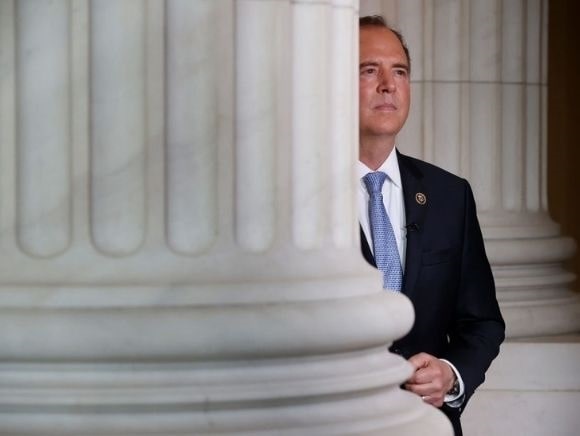Democracy is a fragile thing, and it has two critical flaws. First, voters can be misled, frightened, or otherwise coerced into making bad choices at the ballot box – or simply make uninformed choices based on their own prejudices and preconceived notions. Then there’s the minority. Even if it comprises 49.9% of the population, it’s subjected to the will of the majority; in this hypothetical case, the other 50.1%. Still, in a democracy, the people – or at least those who make up the majority – do get to choose their leaders, which is better than any other system of government.

(Photo By Lea Suzuki/The San Francisco Chronicle via Getty Images)
Democratic countries have traditionally accepted two remedies available to those who did not get their way on election day. The first is to campaign, to donate money, or to otherwise work to get their preferred candidate elected next time – or perhaps even run for office themselves. The second remedy is protest. If citizens are dissatisfied with the political or economic decisions being made by elected officials, they gather for public demonstrations. They make their voices heard. In America, their right to do so is protected by the First Amendment.
Most or all of the Democrats currently staging this pantomime known as the January 6 committee hearings are on record at one time or another expressing their belief that protest is a legitimate right – patriotic, even. It is both interesting and disturbing, then, that they immediately disown this belief the moment the protesters in question oppose their policies and views.
Arbitrary Definition
 Throughout 2020, demonstrations by left-wing activists frequently turned violent and destructive. Police officers and civilians were killed or maimed, private businesses were burned and looted, and entire neighborhoods were virtually destroyed. The same Democrats supposedly horrified by the events of Jan. 6 on Capitol Hill uttered not a word of dismay over the chaos in Minneapolis, Portland, and several other American cities. In fact, many of them encouraged these riots, even as they were aware of the violence and devastation.
Throughout 2020, demonstrations by left-wing activists frequently turned violent and destructive. Police officers and civilians were killed or maimed, private businesses were burned and looted, and entire neighborhoods were virtually destroyed. The same Democrats supposedly horrified by the events of Jan. 6 on Capitol Hill uttered not a word of dismay over the chaos in Minneapolis, Portland, and several other American cities. In fact, many of them encouraged these riots, even as they were aware of the violence and devastation.
None of these Democrats considered for a single second labeling the rioters domestic terrorists. Yet they have attached the label to Trump supporters who demonstrated in the nation’s capital. What is domestic terrorism? The National Security Council (NSC) has adopted a dangerously vague definition of the term:
“Activities that involve acts dangerous to human life that are a violation of the criminal laws of the United States or of any State; appear to be intended to intimidate or coerce a civilian population, to influence the policy of a government by intimidation or coercion, or to affect the conduct of a government by mass destruction, assassination, or kidnapping; and occur primarily within the territorial jurisdiction of the United States.”
The chaos in which Black Lives Matter and Antifa protesters engaged last year – and to a more limited extent continue to engage – fits this definition perfectly. Their activities involved acts dangerous to human life, they violated the criminal laws of the United States, and they “appeared to be intended to intimidate or coerce a civilian population and to influence the policy of the government by intimidation or coercion.” Antifa and Black Lives Matter, then, conform exactly to what anyone adhering to the above definition would describe as domestic terrorist organizations.
 Do the Jan. 6 protesters also meet the criteria to be labeled domestic terrorists? As an entire body, absolutely not. The overwhelming majority of Trump supporters were engaged in peaceful – if vocal and angry – protest. A small minority of individuals who may or may not have been Trump supporters certainly participated in acts dangerous to human life and in violation of criminal laws. Was their intention to intimidate or coerce a civilian population? There is no compelling evidence it was. To influence the policy of government by intimidation or coercion? Perhaps in some cases – but perhaps not.
Do the Jan. 6 protesters also meet the criteria to be labeled domestic terrorists? As an entire body, absolutely not. The overwhelming majority of Trump supporters were engaged in peaceful – if vocal and angry – protest. A small minority of individuals who may or may not have been Trump supporters certainly participated in acts dangerous to human life and in violation of criminal laws. Was their intention to intimidate or coerce a civilian population? There is no compelling evidence it was. To influence the policy of government by intimidation or coercion? Perhaps in some cases – but perhaps not.
Demonstrators involved in physical confrontations with the police, or who entered or attempted to enter the Capitol, were expressing anger at what they felt was a rigged presidential election. Some of them might have believed they could somehow prevent the certification of the result. One could argue, in those cases, they were attempting to affect the conduct of a government through intimidation or coercion, and, therefore, they do conform to the domestic terrorist definition.
Protest Is an Act of Terrorism?
One must be careful, however, of labeling any protest – even loud, angry ones – as terrorism just because demonstrators hope to influence people or the government. When civilians gather in public to voice their objection to political policies, isn’t the objective to influence the policy of a government or to affect its conduct? To be an act of terror, it must be dangerous to human life, violate the law, and be intended to influence through violence or the threat thereof either the population or the government.
At this point, it is appropriate to repeat something Liberty Nation has accurately reported in the past: Only one individual died Jan. 6 as a result of any physical confrontation. The left-wing media and Democrat politicians continue to peddle a myth, claiming several people were killed that day. Two Trump supporters died of natural causes and another from a drug overdose. One police officer, Brian Sicknick, died the following day after suffering two strokes, and a medical examiner confirmed he had no signs of external or internal injuries. Two other police officers took their own lives in the days following the protest. It is entirely unfair – perhaps even disgusting – to speculate about their reasons for doing so or to attach any political influence.
Only Ashli Babbitt, an unarmed Trump supporter, was killed by violent action when a Capitol Police officer shot her at point-blank range for reasons no one except the officer will ever know.
 It is a dizzying proposition indeed to analyze each and every protest or demonstration and decide whether it meets the NSC’s rather nebulous definition of domestic terrorism. In fact, if one were a cynic, one might speculate the definition was deliberately constructed so that, as and when necessary, just about any act of dissent on the part of any group of civilians could be labeled domestic terrorism.
It is a dizzying proposition indeed to analyze each and every protest or demonstration and decide whether it meets the NSC’s rather nebulous definition of domestic terrorism. In fact, if one were a cynic, one might speculate the definition was deliberately constructed so that, as and when necessary, just about any act of dissent on the part of any group of civilians could be labeled domestic terrorism.
Sadly, the current crop of leaders in the United States has decided, for entirely political reasons, to use the label with one set of people while refusing to apply it to another, even though the latter group’s actions far more closely fit the definition itself. If such a double standard is allowed to prevail and, worse still, is cloaked in the mantle of legitimacy, then that one thing which makes democracy palatable – the right of civilians to publicly protest the actions of their government – is imperiled. When a nation reaches the point a protest can be arbitrarily defined as an act of terrorism based on the political agenda of those in charge at the time, then any idea that a free and democratic society exists is nothing more than a mirage.
~
Read more from Graham J. Noble.




